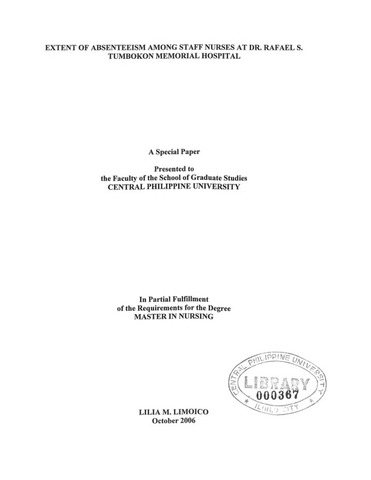Extent of absenteeism among staff nurses at Dr. Rafael S. Tumbokon Memorial Hospital
Abstract
This study was conducted to determine the Extent of Absenteeism Among Staff Nurses at Dr. Rafael S. Tumbokon Memorial Hospital. It sought to answer the following objectives; to describe the respondent’s personal profile such as age, sex, civil status, number of children, tenurial status, length of service, and monthly salary; and the extent of absenteeism.
All the 50 staff nurses of the hospital constituted the respondents of the study. Using the one-shot survey design, data were collected through a self-administered questionnaire. Data on absences were sourced from office documents. The data were processed and analyzed using the Statistical Packages to Social Science Software (SPSS)
The findings of the study show that the staff nurses had a mean age of 38.42. More than three-fourths of them were female, married, with one to two children. Most of the respondents had been in service for almost 10 years or less. The average monthly salary received by the respondents was Php 9,056.65.
One-half of the respondents “never” had incurred any absence from work within the six-month period prior to the survey, while a little more than to one-third of them were “seldom” absent from their job. Only very few of them had been absent “fairly often.”
Their nurses’ sex, age, civil status, monthly salary, number of children, and length of service were found to have no significant relationship with the extent of absenteeism.
The most common reasons cited for absent from work were as follows: illness of the family members, serious accidents, poor working conditions, inadequate leadership, too much workload, personal problems, lack of transportation, poor physical fitness, bad weather conditions, and stress from work.
When they could not avoid being absent from work, they notify their supervisor and personnel officer of their intended absence the day before the absence. In time of emergency absence, they inform the office of the personnel officer by telephone about their failure to report to work.
As preventive measures the nurses suggest the following: 1) They should be engaged in some activities to make themselves physically fit; 2) Those with perfect attendance should be given vacation; and 3) Additional nurses should be provided.
In conclusion, the staff nurses at Dr. Rafael S. Tumbokon Memorial Hospital were in their late thirties, mostly female, married, with one to two dependents and had been in service for almost a decade, but were receiving low salary.
Most of them have “never” been absent from their work. Those who have been absent, reported an average of between three to five absences during the last six months prior to the survey.
Their extent of absenteeism nurses is not influenced by most of their personal characteristics. In other words none of their personal characteristics is associated with their extent of absenteeism.
Description
Abstract only
Suggested Citation
Limoico, L. M. (2006). Extent of absenteeism among staff nurses at Dr. Rafael s. Tumbokon Memorial Hospital (Unpublished Master's special paper).
Type
Special paperSubject(s)
Department
School of Graduate StudiesDegree
Master in NursingShelf Location
GSL Theses 610.73072 L629
Physical Description
vii, 54 leaves
Collections
- Master in Nursing [37]



